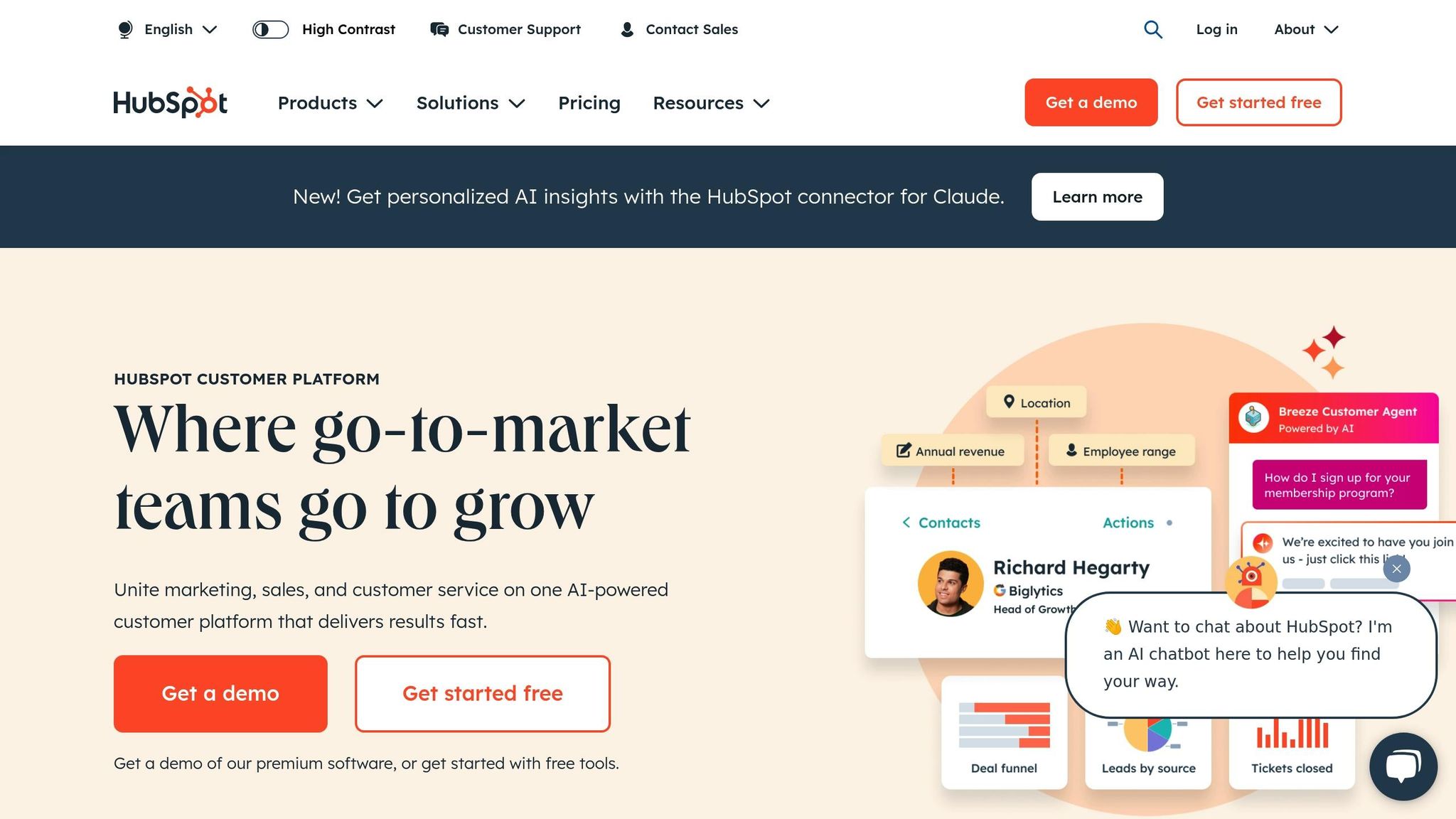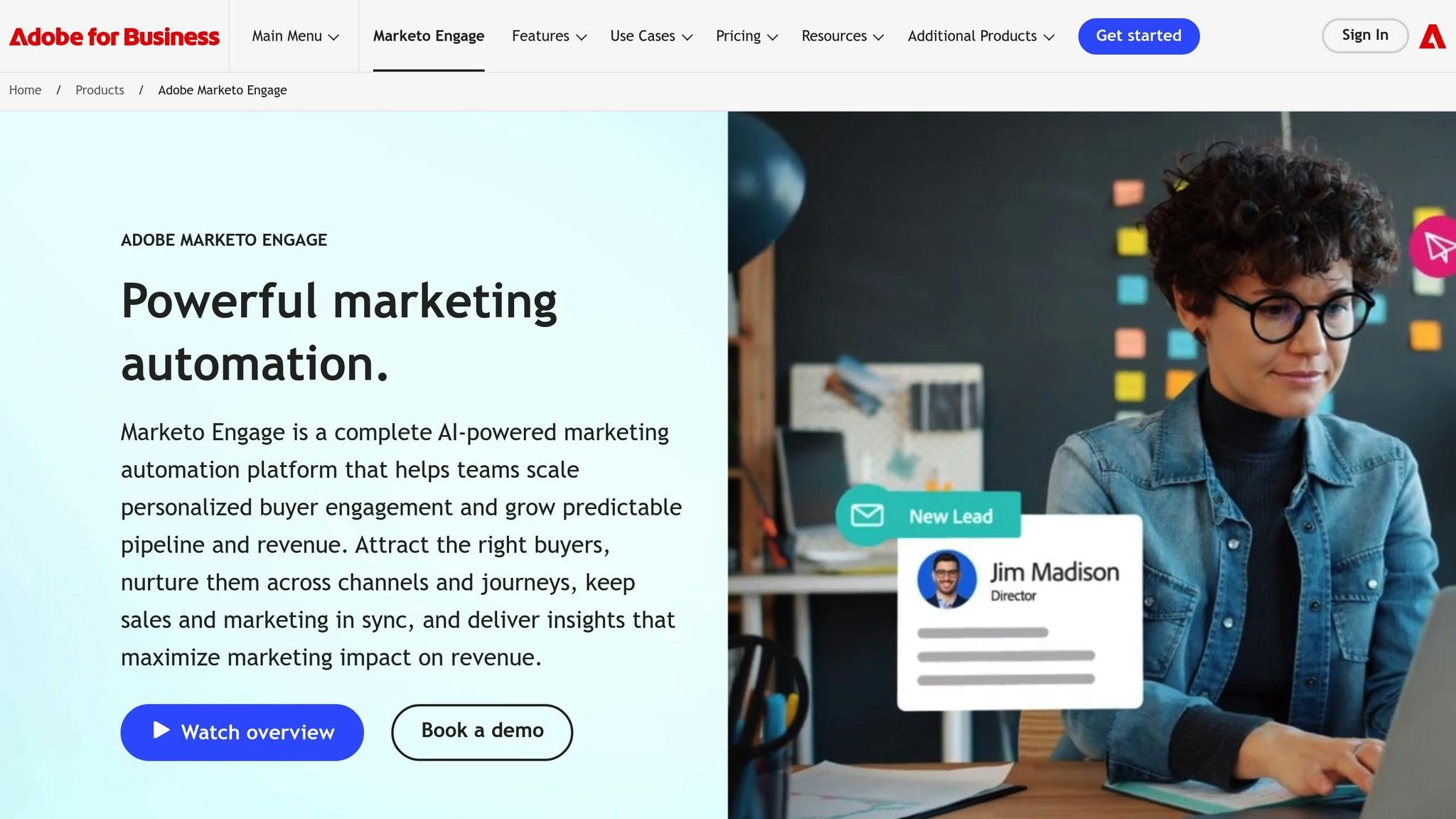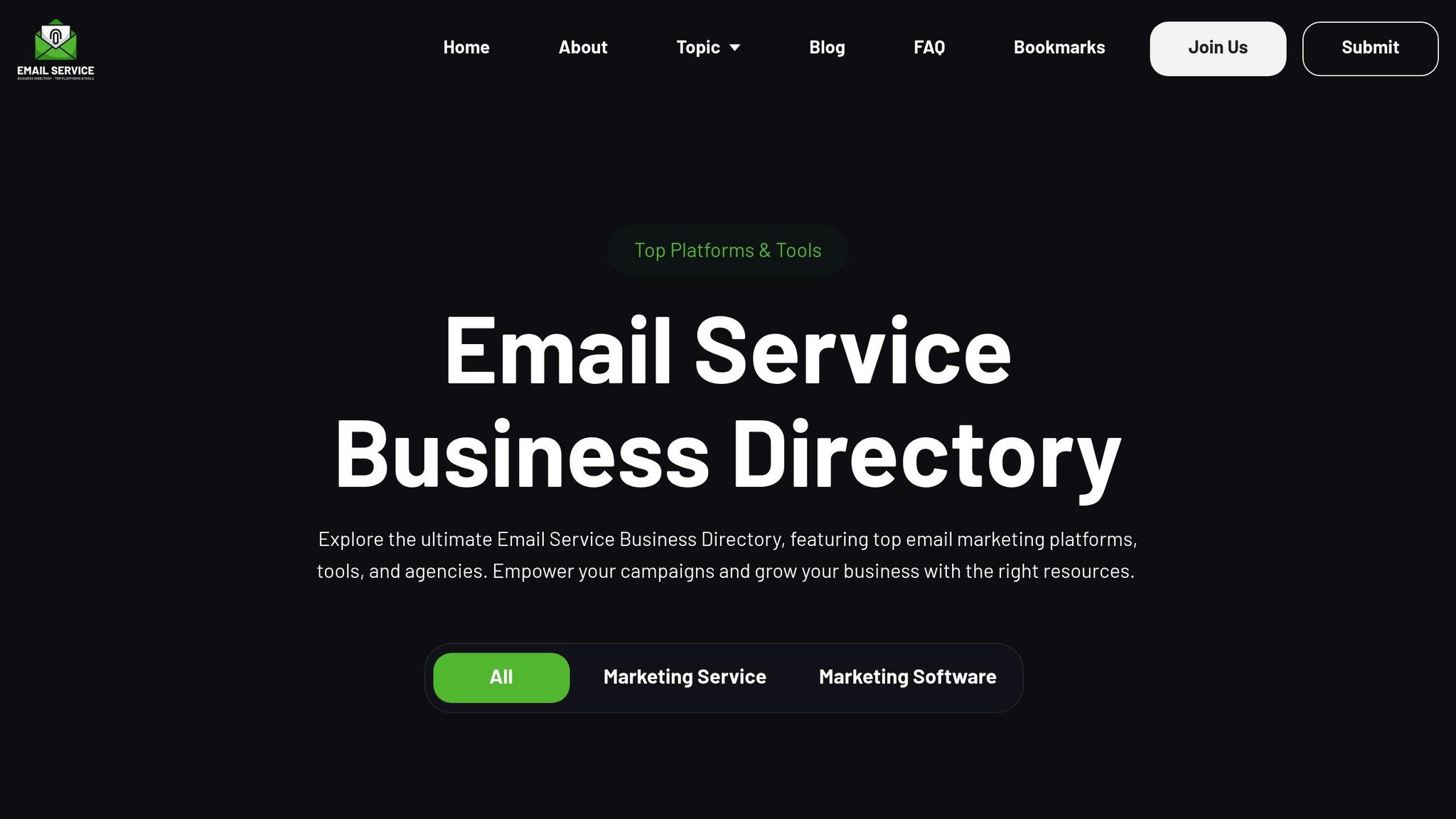Account-Based Marketing (ABM) is redefining how B2B SaaS companies approach sales and marketing. Instead of targeting broad audiences, ABM focuses on specific high-value accounts, delivering personalized campaigns that drive better results. Here's why ABM data integration matters:
- Higher ROI: 87% of marketers report ABM outperforms other strategies.
- Improved Metrics: ABM boosts conversion rates (5-15% vs. 1-2%), deal sizes ($100K+ vs. $25K), and customer lifetime value ($200K+ vs. $50K).
- Stronger Collaboration: Companies aligning sales and marketing see a 32% revenue increase.
Top platforms like HubSpot, Marketo Engage, and the Email Service Business Directory offer unique solutions for ABM data integration, each catering to different business needs. HubSpot simplifies processes with built-in tools, Marketo handles large-scale data with advanced integrations, and the Directory provides curated, cost-transparent email solutions.
Quick Comparison:
| Feature | HubSpot | Marketo Engage | Email Service Business Directory |
|---|---|---|---|
| Ease of Use | Intuitive interface | Steep learning curve | User-friendly curated listing |
| CRM Integration | Built-in CRM with 100+ options | External CRM required | Lists tools with CRM support |
| Pricing Transparency | Public pricing, onboarding fees | Contact sales for quotes | Clear tiered pricing ($299–$2,999) |
| Data Integration | Internal lead enrichment | Adobe Real-Time CDP integration | Aggregates vetted tools |
| Best For | Small to mid-sized businesses | Large enterprises | Cost-conscious businesses |
Choosing the right platform depends on your company's size, budget, and technical needs. ABM integration is key to driving growth by aligning teams and improving account-level insights.
The Power of ABM with Intent Data in B2B Strategies | Marketing In the Now ft. Riaz Kanani
1. HubSpot ABM Features

HubSpot's ABM solution emphasizes data protection and privacy, which are crucial when managing sensitive customer information.
US Compliance and Privacy Standards
HubSpot adheres to the EU-U.S., UK, and Swiss-U.S. Data Privacy Frameworks, reinforcing its commitment to safeguarding user privacy. As the company states, "HubSpot is committed to protecting your privacy".
The platform operates in dual roles: as a data controller when managing user interactions and as a data processor when customers collect and handle information. HubSpot provides extensive privacy tools, allowing users to:
- Access, correct, or delete data
- Object to or restrict data processing
- Withdraw consent at any time
Additionally, HubSpot includes a Data Processing Agreement (DPA) in its Customer Terms of Service, further strengthening its privacy measures.
This robust compliance structure ensures that ABM data is seamlessly managed, creating a solid foundation for comparing HubSpot's features with other platforms.
2. Marketo Engage

Marketo Engage provides a robust ABM solution designed for businesses handling large-scale data. With the ability to process up to 200,000 records per hour and 2 million records daily, this platform is ideal for scaling B2B SaaS companies with vast customer databases. It works seamlessly with Adobe applications, enabling data enrichment, campaign optimization, and content management. This high processing capacity ensures smooth CRM integration, making it a reliable choice for enterprise-level operations.
CRM and Email Tool Compatibility
Marketo Engage features native, bi-directional integration with top CRM systems like Salesforce, Microsoft Dynamics, and Veeva, ensuring continuous data synchronization between marketing and sales teams. Beyond that, it offers over 500 pre-built integrations, including Oracle Sales Cloud, and extends its functionality to webinar and event management tools such as ON24, Zoom, and GoToWebinar.
"It was very important for us to select marketing software that scaled quickly, could easily integrate with our other systems, and allow all of our marketers to become power users."
– Nisha Ahluwalia, VP of Product Marketing, RingCentral
Additionally, the platform supports both standard and custom objects, enabling businesses to tailor data structures to align with their specific processes. This flexibility enhances the platform's ability to meet compliance requirements effectively.
US Compliance and Privacy Standards
Marketo Engage is equipped to handle various US and international privacy regulations, including GDPR, CCPA, PDPA, LGPD, and NZPA. A standout feature is the Compliance Card in the Person Detail View, which displays critical details like a contact's Authorization Type and Source Type and allows for bulk updates. The platform also appends unsubscribe links to all emails automatically and synchronizes opt-out preferences with CRM systems like Salesforce, ensuring compliance with privacy standards.
"We were receptive to the GDPR and the accompanying privacy controls and rules that came into effect because it promotes trust, transparency and choice. As new laws come into effect such as the California Consumer Privacy Act, we know OneTrust will continue to help us with our global privacy program. We fully expect we will have to further customize modules, applications and templates to adjust to these new requirements, and OneTrust can help us with this process."
– Matthew Fischer, Associate General Counsel and Chief Privacy Officer, Marketo
Pricing and Scalability
Built with enterprise needs in mind, Marketo Engage is designed to scale alongside businesses as they expand their ABM efforts. Its ability to process millions of records daily makes it particularly suited for large B2B SaaS companies managing extensive customer databases. In March 2025, VikramBist from the Marketing Nation community praised Marketo's Target Account Management (TAM) module for its effectiveness in identifying and managing ideal customer profiles, prioritizing accounts, and creating targeted campaigns using detailed firmographic and technographic data. The platform's automated integration capabilities streamline data synchronization across the marketing tech stack, reducing complexity as businesses grow. This ensures a unified view of the customer journey, strengthening ABM strategies.
3. Email Service Business Directory

The Email Service Business Directory is a carefully curated resource designed to help B2B SaaS companies enhance their account-based marketing (ABM) strategies through seamless email marketing integration. By highlighting top-tier tools and platforms, DevriX's directory simplifies the process of finding solutions that align with your ABM goals.
Data Integration Capabilities
This directory focuses on email platforms that excel at integrating ABM data. These tools allow B2B SaaS companies to navigate complex customer journeys while creating highly targeted campaigns based on firmographic and behavioral insights. Whether it's nurturing leads or streamlining SaaS onboarding emails, these solutions are tailored to meet the unique challenges of ABM.
CRM and Email Tool Compatibility
A key feature of the directory is its emphasis on email platforms that work seamlessly with CRM systems. These tools enable real-time sharing of account insights between marketing and sales teams, ensuring alignment and efficiency. Many of the featured platforms offer native integrations with widely-used CRMs, automation tools, and sales platforms, making them ideal for businesses aiming to unify their marketing and sales efforts.
US Compliance and Privacy Standards
Given the growing concerns around data privacy - studies show that nearly 50% of Americans hesitate to make purchases due to confidentiality fears, and 88% demand clear consent practices - the directory prioritizes email platforms that adhere to US regulations like the CCPA. These platforms also provide transparent consent management features, helping businesses build trust with their audience.
Pricing and Scalability
The Email Service Business Directory offers flexible pricing options to match the needs of businesses at different stages of growth. Here's a breakdown of the plans:
- Boost Plan at $299: Designed for smaller businesses, this plan includes essential tools and analytics for managing up to 1,000 contacts.
- Advanced Plan at $999: Ideal for mid-sized companies, this option adds automation features, advanced analytics, and CRM integration for up to 10,000 contacts.
- All-in Plan at $2,999: Perfect for larger enterprises, this plan provides unlimited contact management, access to all features, and priority support.
These tiered options ensure that businesses can scale their email marketing efforts in tandem with their evolving ABM strategies, making it easier to stay aligned with long-term goals.
sbb-itb-6e7333f
Pros and Cons
Each platform comes with its own set of trade-offs. Your choice should align with your technical requirements, budget, and growth plans.
HubSpot: Strengths and Weaknesses
HubSpot's standout feature is its all-in-one design, which simplifies operations for businesses. Its built-in CRM integrates marketing, sales, and service data seamlessly, while offering over 100 native third-party CRM integrations. This makes it a flexible yet straightforward option for many businesses.
Another big plus is HubSpot's user-friendly interface, which helps teams roll out campaigns quickly. This ease of use reduces both implementation time and training expenses.
On the downside, HubSpot's pricing can escalate as your business grows. For example, the Marketing Hub Professional plan starts at $890 per month, with a $3,000 onboarding fee. The Enterprise tier jumps to $3,600 per month, paired with a $7,000 setup cost. Some users have also reported frustrations with missing basic features and billing issues, which can be challenging for growing teams.
Marketo Engage: Advantages and Limitations
Marketo Engage shines when it comes to advanced data integration. Its connection with Adobe Real-Time CDP allows businesses to enrich lead and account profiles effectively. The platform also offers AI-powered personalization and integrates bi-directionally with major CRMs like Salesforce, Microsoft Dynamics, and Veeva.
Its robust automation features and multi-touch attribution via Marketo Measure make it a powerful tool for managing complex B2B sales cycles. However, Marketo Engage lacks a built-in CRM, which means you'll need external systems, adding complexity to integrations. Additionally, its steep learning curve and complicated setup process can delay deployment.
These pricing and technical challenges can impact how smoothly ABM data flows between marketing and sales teams.
Email Service Business Directory: A Balanced Option
For those prioritizing transparent pricing and curated solutions, the Email Service Business Directory offers a practical alternative. By providing a vetted list of email platforms designed for seamless ABM integration, it ensures straightforward pricing and predictable costs. Check out their offerings at Email Service Business Directory.
Comparative Analysis
Here’s a snapshot of how these platforms measure up:
| Feature | HubSpot | Marketo Engage | Email Service Business Directory |
|---|---|---|---|
| Ease of Use | 4.4/5 – Intuitive interface | 3.8/5 – Steep learning curve | User-friendly curated listing |
| CRM Integration | Built-in CRM with 100+ integrations | Relies on external CRM systems | Lists solutions with robust CRM integration |
| Pricing Transparency | Public pricing with onboarding fees | Requires contacting sales for quotes | Clear tiered pricing: $299–$2,999 |
| Data Integration | Focused on internal lead enrichment | Adobe Real-Time CDP integration | Aggregates tools vetted for integration |
| Implementation Time | 2–3 weeks for new users | Several months | Varies by chosen solution |
| Best For | Mid-market seeking all-in-one tool | Enterprises with complex needs | Businesses wanting clear pricing and options |
"Account-Based Marketing allows us to laser-focus our resources on the accounts that matter most, resulting in a more effective and efficient sales process."
– John Doe, Director of Marketing at XYZ Corporation
Choosing the right platform depends on your technical needs, budget, and overall growth strategy.
Conclusion
Choosing the right ABM data integration platform comes down to understanding your company's unique needs, budget, and growth plans. Each platform caters to specific priorities, as detailed earlier in this guide, and offers its own set of strengths.
For small to mid-sized businesses searching for an all-in-one option, HubSpot stands out with its seamless CRM integration and user-friendly interface. However, keep in mind that its rising costs may pose challenges as your business scales. On the other hand, Marketo Engage is ideal for larger enterprises with complex B2B marketing needs, offering advanced data management capabilities. Just be prepared for a potentially longer setup process due to its dependence on external CRMs and intricate implementation requirements.
If transparency and predictable costs are key, the Email Service Business Directory strikes a balance by connecting businesses with vetted platforms designed to support ABM strategies. Its curated approach and clear pricing make it a practical choice for companies seeking straightforward solutions.
With 97% of marketers affirming ABM's higher ROI and the market expected to surpass $1.6 billion by 2027, aligning your platform choice with your CRM, technical setup, and budget is crucial. Whether your focus is on lead generation, account nurturing, or pipeline acceleration, select a platform that aligns with your KPIs. Before committing, test the platform’s usability to ensure it fits your team's workflow and supports effective execution of your ABM strategies.
FAQs
How can ABM data integration boost ROI for B2B SaaS companies?
How ABM Data Integration Drives ROI for B2B SaaS Companies
Account-Based Marketing (ABM) data integration plays a key role in helping B2B SaaS companies achieve better ROI by enabling precise and personalized outreach. With the right data in place, businesses can pinpoint high-value accounts, craft messages that address specific needs, and share content that resonates. The result? Shorter sales cycles and bigger deal sizes.
Another advantage is the improved collaboration between marketing and sales teams. When both teams work with unified data, resources are used more effectively, and their efforts are aligned. This synergy not only boosts lead quality and conversion rates but also enhances overall campaign performance, all of which contribute to measurable ROI growth.
Staying data-driven also allows companies to respond to customer behavior in real time. This adaptability helps fine-tune strategies and ensures every effort is geared toward achieving the best possible outcomes.
What should B2B SaaS companies look for in an ABM data integration platform?
When choosing an ABM data integration platform, look for features designed to streamline your processes and deliver measurable outcomes. Some must-haves include intent data tracking, real-time monitoring of account engagement, and automation for workflows. It's also crucial that the platform works smoothly with your current CRM and marketing tools, supports multi-channel campaigns, and provides customizable dashboards to simplify data analysis.
You’ll also want a platform capable of managing large datasets while delivering insights you can act on. Strong reporting and analytics tools are key for evaluating the success of your ABM efforts and fine-tuning your strategies as needed.
How do tools like HubSpot and Marketo Engage stay compliant with global data privacy laws?
Platforms such as HubSpot and Marketo Engage are designed to align with international data privacy laws, including GDPR, by offering tools and policies that prioritize compliance. For example, HubSpot provides features like customizable data privacy settings specifically tailored for EU accounts, along with straightforward privacy management options to help businesses meet regulatory requirements.
In a similar vein, Marketo Engage includes privacy management features and integrates seamlessly with established privacy tools to ensure compliance with regulations like GDPR. These platforms blend secure infrastructure, advanced compliance functionalities, and adherence to global legal standards, making it easier to maintain data privacy across different regions.


